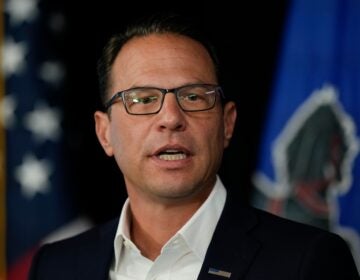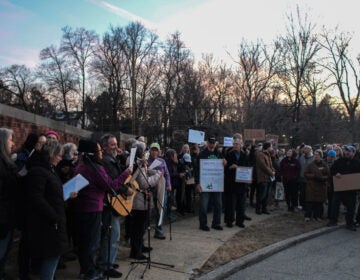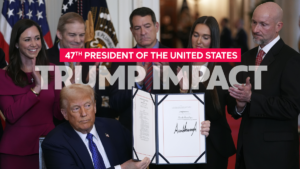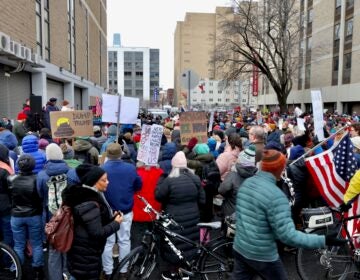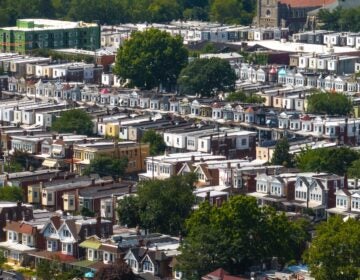How much will Philly’s federal footprint shrink under Trump? Here’s what we know
The economic impact of a smaller federal government in the region has meant fewer workers, canceled office leases, buildings for sale and some contracts terminated.
Listen 1:01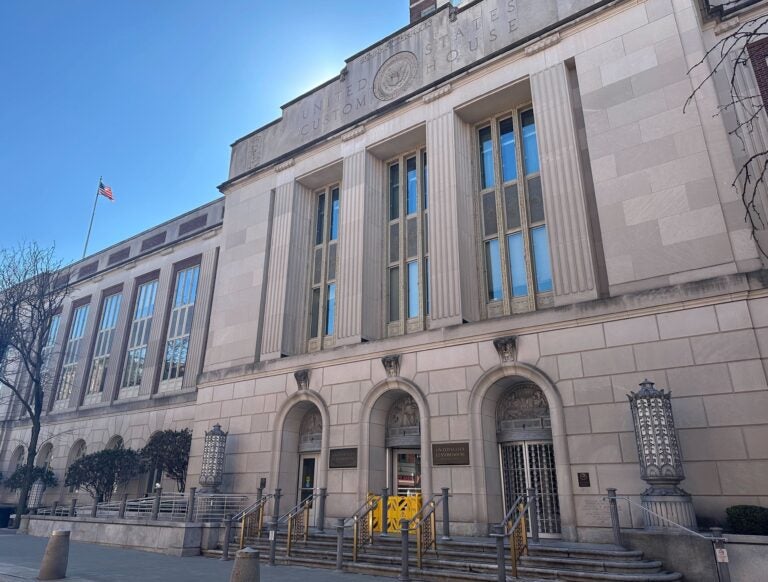
The General Services Administration posted hundreds of federal buildings for sale, then temporarily removed the list for further consideration after "receiving an overwhelming amount of interest," according to the agency. The initial non-core property list for sale included the U.S. Customs House in Philadelphia. (Kristen Mosbrucker-Garza)
Have a question about Philly’s neighborhoods or the systems that shape them? PlanPhilly reporters want to hear from you! Ask us a question or send us a story idea you think we should cover.
The federal government’s footprint in Philadelphia has shrunk during the first 50 days of the Trump administration, shedding jobs, office leases and contracts.
In January, the federal government leased about 1.9 million square feet of office space in Philadelphia through the General Services Administration. That was spread across 55 leases, the largest of which was the Philadelphia Internal Revenue Service office along the 2900 block of Market Street, which includes the entire building.
But the Department of Government Efficiency, or DOGE, an entity created by the administration of President Donald Trump, has canceled six of those leases, totaling about 102,000 square feet, in recent weeks.
Those cancellations include the Philadelphia regional Securities and Exchange Commission, the Department of Education’s Philadelphia Office for Civil Rights, the International Trade Administration, the Bureau of Prisons, a U.S. Secret Service office and the Agricultural Marketing Service in Philadelphia.
The biggest leases were the SEC office inside One Penn Center, spanning 44,765 square feet, and the Department of Education office inside the Wanamaker Building, which is another 42,955 square feet — both of which cost $1.1 million each year.

The moves would save the federal government about $2.6 million each year in office space costs, according to DOGE.
There are six federal buildings in Philadelphia controlled by the GSA, four of which were posted for sale as excess inventory but are now under review.
The three identifiable federal buildings that were posted for sale include the Mid-Atlantic Social Security Center at 300 Spring Garden St., the U.S. Custom House at 200 Chestnut St. and the Veterans Administration Center at 5000 Wissahickon Ave. — all three holding more than 430,000 square feet each.
One of those buildings was not disclosed by address or name, simply identified as “FEDERAL BUILDING 05” by DOGE, so it’s unclear which property that might be or if it was a mistake.
The GSA is the largest office tenant in the country. In almost all of their leases, there is a clause that enables early termination for lack of funding, according to Trepp, a real estate analytics company.
There are 124 properties across the Philadelphia-Camden-Wilmington metro area with GSA leases, according to Trepp data. About 20% of those leases have what’s known as early termination rights.
It’s common that federal leases offer the government early termination rights if funding for an agency is lost, but that clause is not often used because agencies are routinely funded every year.
“For the landlords, historically the [GSA] has been considered a very strong long-term tenant, even with those provisions in place, because the government just generally by definition is slow-moving and there’s not been a lot of impetus to terminate these leases,” said Lonnie Hendry, chief product officer for Trepp Inc., in a recent interview.
While DOGE is a new attempt by the federal government to save taxpayer money, cutting costs on real estate leases is not a new idea.
For years, the GSA has sought to reduce its lease portfolio. It had a 30% reduction target in 2023, Hendry said.
And even if the federal buildings are sold, that doesn’t necessarily mean the government entities will move out. It could be that buildings are simply owned and operated by a real estate investment trust, also known as a REIT, while federal agencies remain as tenants.
“These are very capital-intensive buildings that cost a lot of money to operate, maybe they shed some of these operating expenses by selling these buildings to other operators. There are already REITs that trade specifically in the government space,” Hendry said. “That’s a strong option for a lot of these buildings.”
That sentiment — that a change in federal strategy might not have a big effect on the overall real estate market — was echoed by others in the industry.
“Recent market developments, while noteworthy, are expected to have a limited overall impact,” said Michael Hartnett, senior director for Mid-Atlantic research at JLL, in a recent email. “Looking forward, we anticipate that well-positioned assets will continue to perform, and planned conversion opportunities in some of the affected buildings should help absorb any short-term disruptions.”
The GSA is exploring options for its real estate portfolio, including public-private partnerships, ground leases, sale leasebacks and interagency co-working agreements, and has received an “overwhelming amount of interest” in the buildings previously posted for sale, it said.
“GSA is reviewing all options to optimize our footprint and building utilization,” wrote Leonard Buchanan, a public affairs officer for the GSA, in an email. “To the extent these terminations affect public-facing facilities and/or existing tenants, we are working with our agency partners to secure suitable alternative space.”
Beyond real estate, DOGE is also slashing budgets by canceling contracts and eliminating grants.
During fiscal year 2025, there were more than 2,000 contracts and 1,200 grants with local government, universities and businesses in Philadelphia, according to an analysis on USA Spending.
The largest contracts — with AgustaWestland Philadelphia Corporation, a subsidiary of helicopter manufacturer Leonardo Company, pharmaceutical giant Glaxosmithkline Holdings Inc., and industrial fabrication business Rhoads Industries — were not affected by the cancellations posted by DOGE.
Instead, as an example, a much smaller contract worth $480,151 with Philadelphia-based Jurisolutions Inc., a paralegal services business that helped the office of enforcement of the Consumer Financial Protection Bureau, was canceled.
The local federal workforce has shrunk, too.
Before Trump took office, there were about 14,000 federal workers in Philadelphia. Between voluntary resignations, layoffs at the Internal Revenue Service and the National Park Service, among other agencies, it was not immediately clear how many are still employed with the federal government.
“On a daily basis, they are threatening workers with layoffs,” said Michael Negron, a fellow at the Groundwork Collaborative, a nonprofit think tank and progressive advocacy group. “All of these threats to cut spending are really just destabilizing the federal government.”

Subscribe to PlanPhilly
WHYY is your source for fact-based, in-depth journalism and information. As a nonprofit organization, we rely on financial support from readers like you. Please give today.



